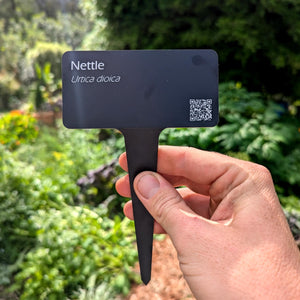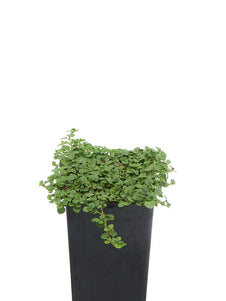
Mint - Corsican Mint
Mint - Corsican Mint

- Low stock - 1 item left
- Inventory on the way

Usually available: All year
Life cycle: Perennial
Height: 2 - 3cm
Position: Sun / part shade
Soil preference: Moist / well drained
This is how we pack and send your Herb Plants to all states except TAS & WA
You will receive
- 1 Corsican Mint Herb Plant in a 50 X 75mm tube - General growing instructions
All of our Herb Plants are grown organically with certified organic potting mixes and fertilizers
Botanical Name: Mentha requienii
Corsican Mint is one of the smallest mint plants available, reaching only 1-3 cm in height, resembling thyme is appearance. It is a matting plant and does spread quite well, so its width is indeterminate. The round, bright lime green leaves are a tiny 2-7mm long and have a strong peppermint aroma when crushed. The leaves are held very tightly together and as this perennial spreads it forms a dense carpet of green leaves. The lavender flowers are also tiny and speckle over the plant throughout summer.
Corsican Mint has the botanical name Mentha requienii and is native to the Mediterranean regions of Corsica, Sardinia, France and mainland Italy. It has been naturalised in other parts of the world, including Great Britain and is considered invasive in the south eastern United States. This mint fills the small gaps in rocky areas and is highly ornamental.
Like most mints when crushed, the leaves release a strong peppermint aroma. Corsican mint is able to take light foot traffic and releases this minty aroma when people pass by.
Mint General
There are many Mint varieties known to herb gardeners and lovers of good cuisine, all varying slightly in flavour, aroma and appearance. They are categorized in the genus ‘Mentha’, which has up to 18 species, within the Lamiaceae family of plants. The Lamiaceae family is known as the mint family. However, the largest group of plants in the mint family is actually the delightful Salvias with their brilliantly coloured blooms. Many other commonly known herbs are also found in this family, including basil, sage, thyme and even lavender. One characteristic of this plant family is that they all yield essential oils, giving each plant its unique characteristics and even potential for medicinal use. Even the Scutellaria genus, with the unusually named Baikal Skullcap is found within this family.
The mints consist of mostly spreading and low growing perennial plants. The height range is from 10 cm to 1 meter, so not all are at ground level. Mint plants send out runners, or stolons, to help them spread by developing roots and shoots at the nodes. This allows plants to cover up to 1 meter in stem growth, in good conditions. They are all fast growing plants and due to the spreading nature, one plant is often sufficient for most gardeners. Some mints can be invasive and it is recommended that containers or in ground barriers be used. Mints can suffer from some pests like snails and aphids and may be affected by mint rust. Rust Free Mint may also be a useful addition to the garden in addition to the many other varieties.
Most mint plants have square stems, with leaves held in opposite pairs. They are often downy with a serrated margin, with a variable leaf shape and colours ranging from green to purple. The flowers are usually white to purple and present in false whorls or verticillaster or false whorl. The corolla is usually two lipped and has 4 lobes, with the upper lobe usually the largest.
Mint plants come from across the globe and will grow in most climates, including a wide range of regions across Australia. Some are annual varieties, but in cool climate zones perennial mints may best be treated as annuals and replaced each year. Generally they have high water requirements and prefer rich soils. Mint is grown commercially in Tasmania due to the ideal conditions of long summer days in high altitudes, where temperatures average 25C during the day to 15C at night. Ideal conditions usually require full sun, but part shade may be necessary as temperatures increase in warm summer regions.
Most mints have a history of traditional medicinal or herbal use for fevers, headaches and minor ailments. These plants are often used as a digestive aid in the form or herbal tea. The essential oil is also antiseptic and may be toxic in very high doses. They should be avoided by pregnant women and must not be given, or placed next to the face of babies and young children, due to the potential for breathing difficulties associated with menthol.
Mint hybridizes very easily, so there are many varieties available to suit any garden. In fact, if you have mixed plants some may hybridize in your own garden. The most popular choices are Spearmint, Peppermint and Applemint. However, many varieties in our collection, such as Ginger Mint, Eau de Cologne, Chocolate Mint and many others are also becoming well known.
Growing Conditions
Corsican Mint is quite easy to grow and may be used as a ground carpet, in rock gardens or amid stepping stones, due to its tolerance of being crushed by occasional foot traffic. This mint will grow in full sun, part shade or even quite shady gardens. It is more tolerant of shade than other mints, but this may reduce the essential oil production, which is greater in full sun. Corsican Mint is much less likely to be invasive than other mints.
Corsican Mint can also take slightly drier conditions than other mints, although it still requires a moist soil. When grown in shade care should be taken to ensure that the area is not too wet, otherwise the leaves will rot. It is not drought tolerant, so a good solution is to let the area dry a little before watering again. All soil types will be suitable and this includes heavy clay. However, sandy soils that remain moist will produce good results. Although Corsican Mint has some frost tolerance it may succumb to heavy frosts, but will self seed and should return in spring. Propagation is easily performed by taking sections of the existing plants, with good root systems, and replanting. This bedding plant is used ornamentally by many gardeners to good effect.
Medicinal Uses
Corsican Mint is used like many other mints for a variety of medicinal purposes. It is antiseptic, used for fevers, digestive disorders, headaches and minor ailments. A tea may be made from the leaves, which are best picked just prior to flowering to obtain the highest essential oil concentration.
Culinary Uses
Corsican Mint is able to be used in a variety of culinary pursuits, including salad preparation and cooked dishes. It is also ideal in drinks, such as refreshing teas, juices, chocolate drinks and flavoured shakes as well as simply adding to cold water. This herb is responsible for the minty flavouring in the Crème de Menthe liqueur. The taste is of peppermint and is also strongly astringent. There is some confusion about whether Corsican Mint is truly edible, but this may be because it has so much more ornamental value.
Other Uses
Corsican Mint is reputed to be an ideal companion plant for the brassica group of vegetables. The strong minty aroma repels the insects and protects the intended food crop from attack. The mint may also improve the flavour of the vegetables in some cases.
All information provided on this website is for informational purposes only. Please seek professional advice before commencing any treatment.




